#Inauguration of Zachary Taylor
Explore tagged Tumblr posts
Text
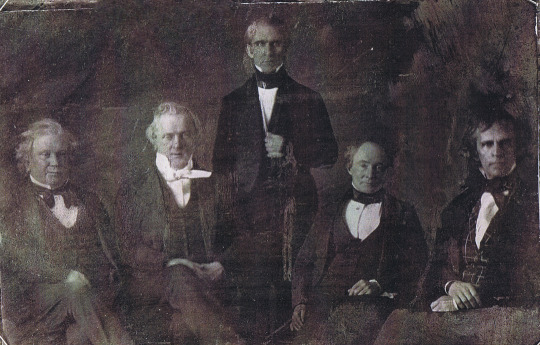
"I had learned this morning that Mr. Buchanan had taken exception to my remark on Saturday last that I should feel that I was deserted by my political family if the members of my Cabinet should call on the President-elect before he called on me. The remark was made because it might have happened that if my Cabinet called on General Taylor he might not afterwards have chosen to call on me at all. As General Taylor belongs to a different political party from myself, and as it was his duty to call on me, if he desired to exchange civilities, I thought it was due to their own self-respect as well as to me that my Cabinet should wait until General Taylor paid his respects to me before they paid their respects to him. In this view all the members of the Cabinet expressed their concurrence on Saturday, except Mr. Buchanan. I learned this morning that Mr. Buchanan had said to a member of the Cabinet that notwithstanding my remark on Saturday he had left the Cabinet-room resolved to call on General Taylor on that day, as General Shields by appointment had called at the State Department to accompany him. He did not, however, do so; but called on General Taylor yesterday, immediately after General Taylor had called on me. Mr. Buchanan is an able man, but is in small matters without judgment and sometimes acts like an old maid."
-- President James K. Polk, on his Secretary of State James Buchanan, shortly before the inauguration of Polk's successor, President-elect Zachary Taylor, in an entry in Polk's remarkable and often immensely petty personal diary (which he religiously updated throughout his Presidency), February 27, 1849.
#History#Presidents#Presidential History#Presidential Quotes#Quotes by Presidents#James K. Polk#President Polk#Polk Administration#James Buchanan#President Buchanan#Zachary Taylor#General Taylor#President Taylor#Inauguration of Zachary Taylor#Presidential Transitions#1848 Election#Politics#Political History#Political Quotes#Political Rivalries#Presidential Rivals#Presidential Rivalries#Presidential Feuds#Presidential Relationships#Diary of James K. Polk#Presidential Diaries#Cabinet of James K. Polk
18 notes
·
View notes
Text
Good news! The channel that plays only old History Channel documentaries had a day entirely devoted to American presidents, so I have a lot more president facts to share with you!
(Important note that I have fact-checked nothing. I am only spouting off trivia the way I would if you were here for me to info-dump at).
Andrew Jackson's wife died soon after he was elected president, and he believed her death was caused by the vicious attacks against her during the election. Because he apparently lived his life as though he were a Shakespeare character, he said something along the lines of, "On the grave of this saint, I forgive all my political and personal enemies, but as for those who slandered her, they must look to God for mercy."
When William Jennings Bryan ran against William McKinley in 1896, he went on an epic nationwide whistle-stop campaign. Though he never drank alcohol, he reeked of liquor throughout his tour--because he was using gin as a deodorant! Instead of stopping to bathe, he would wipe himself down with gin to mask his body odor.
After Harry Truman, it became the practice for both presidential nominees to get security briefings months before the election, so when they came into office they'd be up-to-date on world events--with the understanding that all this info was strictly confidential. When Richard Nixon heard that LBJ's administration was putting together peace talks to end the Vietnam War, he went to the South Vietnamese and told them to refuse to go to the table, because if they waited until he was in office, they'd get a better deal. LBJ found out and told the head of the Republican Party to tell Nixon to stop it, because this was treason. Nixon called LBJ back and said this story was untrue and he had nothing to do with any such actions. LBJ knew he was lying, but only because he'd been secretly recording sessions with the South Vietnamese, so he couldn't do anything without exposing his own actions. Because of this, South Vietnam never came to the bargaining table, and the war dragged on more than five years longer.
When Ronald Reagan was shot by an assassin, Soviet submarine activity increased near US shores, and people thought this might be part of a Soviet attack. George Bush, the vice president, was (I think) in Texas at the time, and immediately started flying back to Washington, but his plane didn't have a secure phone line, so he couldn't be in charge of the country, and people weren't sure who was next in line. Both the Secretary of State and the Secretary of Defense believed that they should be in charge. The press also wanted to know who was in charge, but the press secretary was doing a terrible job at the press briefing, essentially saying that they didn't know who was in command. The Secretary of State then sprinted into the briefing room, took the microphone, and assured everyone that there was a clear chain of command, and he was in charge. The only problem was that he was wrong--he'd completely forgotten that both the Speaker of the House and the President pro tempore of the Senate ranked ahead of him.
At the time this documentary was made (2016), Dick Cheney held the record for the shortest presidency. The president is allowed to temporarily hand over power to the vice president if he's going to be incapacitated. George W. Bush made use of this rule twice when he was going in for colonoscopies, so Dick Cheney served as president for a total of four hours.
#history is awesome#presidential talk#i was babysitting the nephew who was very very fussy#so i was stuck in one room for hours with tv on in the background#this happy coincidence made it rather enjoyable and nephew now has a good grounding in american history#only trouble was that once i finally got a reprieve from babysitting i wanted to keep watching the documentary about elections#they were just about to start lincoln!#i watched through lincoln and mckinley's elections and then even i'd had enough#the lincoln stuff lined up well with what i've read#and i was very glad to have read it because i wouldn't have followed their telling if i didn't have background#i had a minor issue with a line about 'a series of weak presidents had appeased the south for years with compromises'#when zachary taylor's face showed up in that line-up i yelled at the tv 'zachary taylor never compromised on anything in his life!'#the slander!#it's also interesting to see old documentaries and how history changes#the one about early presidents was from 1996 and pushed the 'harrison died of pneumonia after his long inaugural address' narrative#jefferson's slave mistress story was only 'many historians believe this to be true' and not 'tear-down-his-statues settled fact'#among other things this experience made me more appreciative of the merits of broadcast tv#even if these things were available on streaming i'd never pick '1996 presidential elections documentary' on my own#i need some guy desperate to fill airtime to curate this for me
32 notes
·
View notes
Text
It’s common wisdom that William Henry Harrison delivered one killer of a speech after being sworn in as the ninth president of the United States—and it had nothing to do with anything he said.
Ignoring the advice of vigilant mothers everywhere, “Old Tippecanoe” swore off his overcoat, hat and gloves while giving his inaugural address on a freezing, wet winter day. And in a quest to prove his virility while silencing critics who thought him an intellectual lightweight, the 68-year-old Harrison definitely overcompensated by delivering a whopping 8,445-word speech that droned on for nearly two hours. Many believe that history’s lengthiest inaugural address led directly to the briefest of presidencies as Harrison died exactly one month later on April 4, 1841—with the official cause listed as pneumonia.
It is unlikely, however, that the long-winded speech caused the president’s death because he didn’t become sick, complaining of anxiety and fatigue, until more than three weeks after his inauguration. Plus Harrison’s lung ailments didn’t arise until the fifth day of his illness and were not nearly as relentless or progressive as the severe abdominal discomfort and constipation he experienced.
After taking a fresh look at the case, Jane McHugh and Dr. Philip A. Mackowiak of the University of Maryland School of Medicine wrote in a 2014 edition of the journal Clinical Infectious Diseases that Harrison likely died from enteric fever, not from a fatal chill contracted during the inauguration.
The pair pointed to contaminated drinking water as the true cause of Harrison’s demise. Before 1850, the sewage of Washington, D.C., was dumped in a fetid marsh just seven blocks upstream from the White House’s water supply, and the researchers surmised that bacteria seeped into the drinking water and caused the president’s severe gastroenteritis. Harrison’s history of dyspepsia put him at additional risk to the tainted water, which the authors noted may have also contributed to the death of another president, Zachary Taylor.
41 notes
·
View notes
Text
A United States president has left office before completing his term nine times. Four deaths from natural causes, four assassinations, and one resignation.
John Tyler assumed the presidency after William Henry Harrison died shortly after inauguration, but was not re-elected four years later, so he was only elected to the vice presidency.
Millard Fillmore assumed the presidency after Zachary Taylor died, but was not re-elected so he was only elected to the vice presidency.
Andrew Johnson assumed the presidency after Abraham Lincoln was assassinated, but was not re-elected so he was only elected to the vice presidency.
Chester Arthur assumed the presidency after James Garfield was assassinated, but was not re-elected so he was only elected to the vice presidency.
Theodore Roosevelt assumed the presidency after William McKinley was assassinated and was later elected to another term.
Calvin Coolidge assumed the presidency after Warren G. Harding died and was later elected to another term.
Harry Truman assumed the presidency after Franklin D. Roosevelt died and was later elected to another term.
Lyndon Johnson assumed the presidency after John F. Kennedy was assassinated and was later elected to another term.
Gerald Ford assumed the presidency after Richard Nixon resigned and was not re-elected. Ford was also never elected vice president, he was appointed to the position after Nixon's previous vice president, Spiro Agnew, resigned.
Four presidents were elected vice president but not president and one was never elected to either.
14 notes
·
View notes
Note
Do you have a favorite historical figure(s)?
If I put some more thought into it, I could probably come up with a genuine answer that wasn't "haha look at this fucking guy," but it's gotta be President William Henry Harrison

It will never not be hilarious that the Whig Party's first elected president gave the longest inauguration speech in history, took his oath, and promptly shit himself to death 31 days later.
The Whig Party itself is also just funny in that it ran two successful presidential candidates, but both died very early in their terms (Zachary Taylor died after 17 months in office). Four presidents for the price of two, baby! Meanwhile, Henry Clay, just about the only truly impactful Whig figure (Whigure?), lost all FIVE of his attempted campaigns.
You know what, I'm going to run for president as a Whig. Soon I will be accepting donations for my 2036 presidential campaign, on the platform "Down with King Andrew Jackson"
7 notes
·
View notes
Note
Okay you’ve asked me so now I want to ask you- Infodump about your favorite historical figures!
okay. okay, here we go.
i have several favorites, but right now i only have the time to infodump about one because this post will be the length of a novel otherwise. here are the historical figures I think are interesting:
john “i am quite certain that the crimes of this guilty land will never be purged away but with blood” brown
alan turing alan turing alan turing
if authors count i am utterly captivated by truman capote
charles sumner kicked ass
there was a period in which the ghost of FDR was regularly stealing my ability to speak so that’s something (i do not like him)
and here’s the one I’ve chosen to talk about, because his entire situation was a complete joke: william henry fucking harrison, the ninth president, who nobody gives a single shit about. well, unless you’re my one friend who has an ungodly obsession with him … or, of course, if you’re me.
this man’s presidency was what the kids call absolutely bonkers-fucking-wild. he died just 31 days after his inauguration, and was the first president to die in office. unsurprisingly, he also had the shortest presidential term. ever. yes, this is the thing he’s remembered for — well, aside from the fact that he had a goddamn theme song, which is clearly also a major part of his legacy considering there’s a they might be giants cover of it out there.
you may be thinking, “daniel, why did he just … die? was it a james polk and/or zachary taylor thing, since water sanitation didn’t really exist then? you know, the classic white house cholera?”
well, yeah, probably. but the most common factoid that people have been repeating for ages now is that he ended up with pneumonia… after delivering the longest fucking inauguration speech in american history. outside. in the rain. without a coat. and he rode there on horseback. just showed up on a horse. the speech was almost two hours long, and clocked in at 8,445 words — and that was after daniel webster (yeah, him) edited it for length.
5 notes
·
View notes
Text
They also did it because they loved that he killed "commies". Something I think people forget is how much in the famous poem, so many people approved of the deaths of some but not others. That is the point of the poem, yet I think it's something society has not dealt with properly.
am disappointed by the lack of connections to another period in history.
You know who else really loved to scream about immigrants, how bad the government was, how bad public education is, really loves to kill people, and threw a fit because they lost an election?
The Rebellion against the united states, AKA the so-called confederacy. They ALSO, claimed that the economy would be lost. They ALSO claimed that without slaves they couldn't compete. They ALSO said EVERYTHING THE CONSERVATIVES DO NOW, BECAUSE THEY ARE ALMOST THE SAME PEOPLE.
their leaders, a lot of rich white men from the south, insisted the progressive party of 1860 was unconstitutional because it was abolitionist.
They IMMEDIATELY seceded when Lincoln won. he DID NOT DO ANYTHING. HE WAS NOT EVEN INAUGURATED YET.
They said in their declarations of secession that the abolitionist majority of the country had taken over. as in... they complained that they lost the election. THAT IS WHAT THEY SAID.
The South seceded because a man associated with the abolitionist party got into the white house. They had control of it for DECADES. IN fact, before Nixon, the worst presidents we ever had were Zachary Taylor, Franklin Pierce, and James Buchanan, the guys who led up to Lincoln.
The South HAD NO LEGITIMATE COMPLAINTS, AND NO RIGHT TO SECEDE. "MOMMY, THE BIG BAD VOTERS OFFENDED ME BY SAYING I COULDN'T OWN SLAVES". They killed 3 out of every 100 Americans over a fucking TEMPER TANTRUM, and have the GALL to pain themselves as victims ever since.
You know what the difference is between former US Army Colonel, mass murderer, and terrorist Robert E Lee, and Osama Bin Laden is? LEE HAS A HIGHER BODY COUNT. Lee is the biggest murderer of Americans in a single day than anyone else in history, and putting up statues to him is tantamount to putting up bin Laden statues. Former US senator and terrorist leader Jefferson Davis led the war that killed more Americans than anyone else COMBINED.
These are the greatest traitors, murderers, and MONSTERS in American history. they were cowards, and got off practically scot free. Lee, "blood dripping with the hands of murdered innocent's" in the words of judge underwood, tolerated plenty of abuse of POWs in that time, and when questioned, pretended to not know a thing.
So, the greatest white supremacist mass murdering slavers, who went into battle screaming "I'M A BAD PERSON" while wearing t-shirts saying "I hate democracy and freedom", are idolized in the US as bastions of freedom and liberty. They were authoritarian bastards who wanted to plunge millions of American citizens into never ending slavery, they were the worst monsters the US ever fought outside the Nazis. Fighting them, bashing their damned skulls in, burning their cities, and finally subduing their damn white supremacist skins was one of the greatest things the US ever did.
And half the country idolized these OBJECTIVELY MONSTROUS PEOPLE for a century.
The roots of the current crisis lie not simply in WWII, in the white supremacist history that came from letting these jackals, these murderers, these monsters in the shape of men get off, and allowing their white supremacist children to write the history books.
Yo, correct me if I am wrong please, but didn't Hitler rise to power because he promised to fix the German economy and people really liked that so they looked past everything else he was doing??? Like exactly what's happening in America right now???
So many people said they voted for Trump, put a truly evil person in power, because he said he'd fix the economy, and a little voice in my head is going, "Isn't that what happened with fucking Hitler??"
But I've seen no one point that out so maybe I'm miss remembering???????
86K notes
·
View notes
Text
Events 3.4 (before 1900)
AD 51 – Nero, later to become Roman emperor, is given the title princeps iuventutis (head of the youth). 306 – Martyrdom of Saint Adrian of Nicomedia. 581 – Yang Jian declares himself Emperor Wen of Sui, ending the Northern Zhou and beginning the Sui dynasty. 852 – Croatian Knez Trpimir I issues a statute, a document with the first known written mention of the Croats name in Croatian sources. 938 – Translation of the relics of martyr Wenceslaus I, Duke of Bohemia, Prince of the Czechs. 1152 – Frederick I Barbarossa is elected King of Germany. 1238 – The Battle of the Sit River begins two centuries of Mongol horde domination of Russia. 1351 – Ramathibodi becomes King of Siam. 1386 – Władysław II Jagiełło (Jogaila) is crowned King of Poland. 1461 – Wars of the Roses in England: Lancastrian King Henry VI is deposed by his House of York cousin, who then becomes King Edward IV. 1493 – Explorer Christopher Columbus arrives back in Lisbon, Portugal, aboard his ship Niña from his voyage to what are now The Bahamas and other islands in the Caribbean. 1519 – Hernán Cortés arrives in Mexico in search of the Aztec civilization and its wealth. 1628 – The Massachusetts Bay Colony is granted a Royal charter. 1665 – English King Charles II declares war on the Netherlands marking the start of the Second Anglo-Dutch War. 1675 – John Flamsteed is appointed the first Astronomer Royal of England. 1681 – Charles II grants a land charter to William Penn for the area that will later become Pennsylvania. 1769 – Mozart departed Italy after the last of his three tours there. 1776 – American Revolutionary War: The Continental Army fortifies Dorchester Heights with cannon, leading the British troops to abandon the Siege of Boston. 1789 – In New York City, the first Congress of the United States meets, putting the United States Constitution into effect. 1790 – France is divided into 83 départements, cutting across the former provinces in an attempt to dislodge regional loyalties based on ownership of land by the nobility. 1791 – Vermont is admitted to the United States as the fourteenth state. 1794 – The 11th Amendment to the U.S. Constitution is passed by the U.S. Congress. 1797 – John Adams is inaugurated as the 2nd President of the United States of America, becoming the first President to begin his presidency on March 4. 1804 – Castle Hill Rebellion: Irish convicts rebel against British colonial authority in the Colony of New South Wales. 1813 – Cyril VI of Constantinople is elected Ecumenical Patriarch of Constantinople. 1814 – War of 1812: Americans defeat British forces at the Battle of Longwoods between London, Ontario and Thamesville, near present-day Wardsville, Ontario. 1837 – The city of Chicago is incorporated. 1848 – Carlo Alberto di Savoia signs the Statuto Albertino that will later represent the first constitution of the Regno d'Italia. 1849 – President-elect of the United States Zachary Taylor and Vice President-elect Millard Fillmore did not take their respective oaths of office (they did so the following day), leading to the erroneous theory that outgoing President pro tempore of the United States Senate David Rice Atchison had assumed the role of acting president for one day. 1861 – The first national flag of the Confederate States of America (the "Stars and Bars") is adopted. 1865 – The third and final national flag of the Confederate States of America is adopted by the Confederate Congress. 1865 – U.S. politician Andrew Johnson made his drunk vice-presidential inaugural address in Washington, D.C. 1878 – Pope Leo XIII reestablishes the Catholic Church in Scotland, recreating sees and naming bishops for the first time since 1603. 1882 – Britain's first electric trams run in east London. 1890 – The longest bridge in Great Britain, the Forth Bridge in Scotland, measuring 8,094 feet (2,467 m) long, is opened by the Duke of Rothesay, later King Edward VII. 1899 – Cyclone Mahina sweeps in north of Cooktown, Queensland, with a 12 metres (39 ft) wave that reaches up to 5 kilometres (3.1 mi) inland, killing over 300.
0 notes
Text
Today in History: MARCH 5, Stalin dies after long USSR reign - best today news
Today in History Today is Sunday, March 5, the 64th day of 2023. There are 301 days left in the year. Today’s highlight in history: On March 5, 1770, the Boston Massacre took place as British soldiers who’d been taunted by a crowd of colonists opened fire, killing five people. On this date: In 1849, Zachary Taylor was inaugurated as the 12th president of the United States. (The swearing-in was…
View On WordPress
0 notes
Text
Today in History: MARCH 5, Stalin dies after long USSR reign#Today #History #MARCH #Stalin #dies #long #USSR #reign
Today in History Today is Sunday, March 5, the 64th day of 2023. There are 301 days left in the year. Today’s highlight in history: On March 5, 1770, the Boston Massacre took place as British soldiers who’d been taunted by a crowd of colonists opened fire, killing five people. On this date: In 1849, Zachary Taylor was inaugurated as the 12th president of the United States. (The swearing-in was…

View On WordPress
0 notes
Text
"Although I have never had the pleasure of a personal acquaintance, nor can I flatter myself that you have ever heard of me before the late convention, yet as I feel quite acquainted with you from a general knowledge of your widely extended reputation, and as our fellow citizens have seen fit to associate our names for the next Presidential contest, I take the liberty by introduction of enclosing a copy of my acceptance of the nomination...I should be happy to hear from you."
-- Millard Fillmore, writing to General Zachary Taylor with his acceptance of the Whig Party's nomination to be Taylor's Vice President in the 1848 election. Not only had Taylor and Fillmore never met before becoming running mates, but they'd never even corresponded prior to this message sent by Fillmore.
The first time that Taylor and Fillmore actually met one another in-person was at the Willard Hotel in Washington, D.C. in late-February 1849, just a week before they were to be inaugurated -- and nearly four months after they had been elected President and Vice President.
#History#1848 Election#Zachary Taylor#President Taylor#Taylor Administration#General Taylor#Millard Fillmore#Vice President Fillmore#President Fillmore#Presidents#Presidency#Presidential Quotes#Presidential Correspondence#Presidential Relationships#Running Mates#1848 Whig National Convention#Inauguration of Zachary Taylor#Vice Presidents#Presidential History#Presidential Elections#Politics#Political History#Taylor/Fillmore#Presidential Inaugurations
5 notes
·
View notes
Text
Because @maltheniel has enabled me, I'm going to tell you about William Henry Seward.
If you had the American history education that I had, you might have heard of a thing called Seward's Folly--also known as Alaska. Seward was the Secretary of State who was mocked for buying America territory in what appeared to be a barren wasteland, until he was vindicated by the discovery of oil and gold and a jillion other useful natural resources. If you had the education that I had, this is the only thing you heard about him, but the more I look into the Civil War, the more baffling this is, because this guy is everywhere in the political scene of the time.
Seward was an extremely vocal anti-slavery Whig from New York. He started as a US Senator in 1849, and he became part of President Zachary Taylor's inner circle, influencing him to support measures to keep slavery out of the new territories. After Taylor died, the question of slavery in the territories dominated politics for the next decade, with the conflict getting more heated and the positions getting more polarized. The Whig Party fell apart because of disagreements over the issue; Seward held on for as long as he could, but eventually joined the newly-forming Republican Party, and became well-known for his eloquent speeches against slavery.
When it came time to choose the Republican nominee for the 1860 presidential election, Seward was by far the top candidate. All but a shoe-in. Unfortunately, some of his anti-slavery speeches were a bit too eloquent, and gave him a reputation for being much more radically anti-slavery than he was. A significant portion of the party doubted he could win a nationwide election when slavery was such a divisive issue. This gave Lincoln's team a chance to pitch him as a less-radical option, which allowed him to come from behind and win the nomination.
Seward was extremely gracious about the loss, immediately publishing letters announcing his full support of Lincoln as candidate, and putting his own campaign manager to work getting Lincoln elected. Privately, though, he was seething. He had been in politics for decades, helped to build the party, and then lost his chance at the presidency to a guy who'd been working as a backwoods lawyer for the last twelve years.
But he knew his politics, and knew it was better to support the party's candidate than to oppose him. Lincoln offered Seward the prime Cabinet position of Secretary of State--he was qualified for it and deserved it--and Seward accepted. Seward hoped that he'd be able to help select the other Cabinet members, so he could pick people from his own faction who he'd work well with. Then he, with his extensive connections and political experience, could be the real head of the administration, with Lincoln as a compliant figurehead.
Lincoln was having none of it. He listened to Seward's suggestions, but he'd basically already chosen the people he wanted for his Cabinet, across all factions of the party. While he made use of Seward's expertise and trusted him as Secretary of State, he was going to be head of his own administration and be the one making all the final decisions. After a rocky start, Seward came to recognize that Lincoln had a shrewd mind and good judgement, and he became Lincoln's loyal supporter and a good friend.
But there was a persistent idea that Seward was the real power behind the throne, sparked partly by the prominent role he took in Washington between the election and the inauguration. States started seceding almost as soon aa Lincoln was elected, and Seward was the one who had to hold things together in Washington while Lincoln was tying things up in Illinois. He was getting reports from informants, watching out for Southern spies, and keeping Lincoln abreast of what was going on. He gave a stirring speech to Congress urging the Southern states to keep the Union together, offering all sorts of concessions to mollify them, such as amendments preventing the federal government from interfering with slavery. It was a highly controversial speech, and his wife, Frances, raked him over the coals for it. She understood, earlier than almost anybody, that this crisis would turn into a long war about slavery, and that they couldn't afford to bend on that issue, even to keep the Union together. (Lincoln privately approved of several measures Seward talked about, but publicly said little, preferring to see the public's response to Seward before taking official positions.)
Seward was a little bit like a Civil War version of Evil Chancellor Traytor. Under both Lincoln and Johnson, rumors persisted that Seward was the shadowy figure who was really in charge, secretly manipulating the president into making unpopular decisions, even though most of the time, Seward had nothing to do those decisions, and often disagreed at least partially with what the president chose to do.
Best example of the effects of this misconception is the time Seward came under attack during the middle of the war. The war was going badly, and since people couldn't directly attack the president, they started going after Seward. Chase, the Treasury Secretary, told some members of Congress that Seward was the reason the Cabinet couldn't get along, and that he was always trying to take control. These senators wanted to meet with the president and force him to get rid of Seward. When Seward heard about this, he gave Lincoln his letter of resignation, not wanting to cause problems for the administration. Lincoln responded by allowing the senators to join in a Sewardless Cabinet meeting. When confronted with both the senators and the Cabinet, Chase was forced to admit that his stories had been exaggerated, and the other Cabinet members rallied to Seward's defense, resenting Congress' meddling. Lincoln refused to accept Seward's resignation, and Seward returned to the Cabinet, having been saved by Lincoln's political acumen.
I'm going to skip ahead so I can tell you the craziest part of the story. Four days before the Civil War officially ended, Seward got into a carriage accident that left him bedridden with a broken jaw and a bunch of other injuries. When told of Lee's surrender on April 9th, Seward said (through a broken jaw, after barely surviving a painful accident), "For the first time in my life, you've made me cry." (Which is both touching and an incredibly badass claim, given what he's just suffered.)
Five days later, John Wilkes Booth shot the president at Ford's Theater. Everyone knows (or should know) that part of the story. What I didn't know was that his conspiracy also called for Seward's assassination. Booth knew his Shakespeare and didn't want to leave Seward alive as a Marc Antony to eulogize the dead tyrant. (He also wanted to kill Andrew Johnson, but that assassin chickened out, and it's not really important to this story).
While Booth was at the theater, his co-conspirator went to Seward's house under the pretense of delivering medication. When Seward's son wouldn't let him go upstairs, the assassin tried to shoot him and broke his skull with the gun. The assassin then made his way to Seward's bedroom--where, I need you to remember, Seward was still bed-ridden--and stabbed him five times in the face and neck. Like, sliced away flaps of flesh. The only reason Seward didn't die was because the splint for his broken jaw deflected the blade away from his jugular vein. And because his other son and bodyguard made it into the room and forced the assassin to flee.
Chalk this one up in the "Parts of American History I'm Furious No One Told Me About" column.
While Seward was recovering, they hid the president's death from him, thinking he wouldn't survive the shock. But he figured it out three days later when he saw the flags at half-staff through his bedroom window, and realized that if Lincoln were alive, he'd have been the first to come see Seward after the attack.
Of course, Seward survived (badly scarred) and went on to buy Alaska. Which is an interesting story. But not half so interesting as all the stuff that came before it.
#history is awesome#presidential talk#answered asks#maltheniel#i really tried to keep this short#but there's just too much that i find interesting about this guy#like i said he was involved in everything political at the time#and you've got to talk about a lot of it to get across just how involved he was#like i had the whole post written out and then realized i hadn't even talked about the between-administrations thing#i can't leave that out!#so even though no one wants to read that much about william seward i want to tell you that much about him and it's my blog so there#i also have to add that it was very satisfying to head to wikipedia#and find out that his first political party was specifically an anti-mason party#and that he got criticized for his support of catholics#he's a career politician so there's a lot to disapprove of but i very much like both of those things about him
196 notes
·
View notes
Quote
Let us invoke a continuance of the same protecting care which has led us from small beginnings to the eminence we this day occupy, and let us seek to deserve that continuance by prudence and moderation in our councils, by well-directed attempts to assuage the bitterness which too often marks unavoidable difference of opinion, by the promulgation and practice of just and liberal principles, and by an enlarged patriotism, which shall acknowledge no limits but those of our own widespread Republic.
Zachary Taylor, Presidential Inaugural Address March 5, 1849
2 notes
·
View notes
Text
Today in Christian History

Today is Monday, March 4th, the 63rd day of 2019. There are 302 days left in the year.
Today’s Highlight in History:
1303: Death of Daniel, Grand Prince of Moscow, the youngest son of Alexander Nevsky. He had received as his inheritance a lowly domain centered on Moscow, which he ruled peacefully. Through wise alliances and a timely defeat of the Tatars, he had raised Moscow to preeminence. According to tradition, he founded two monasteries. He became a monk himself shortly before his death. Three and a half centuries later the Russian Orthodox Church will declare him a saint.
1621: Death in Brussels of Ana de Jesús, a discalced (shoeless) nun who had founded several branches of the Carmelites. She had been a close associate of Teresa of Avila. The church will soon declare her “Venerable.”
1805: President Thomas Jefferson in his second inaugural address requests prayer and recalls divine blessings.
1827: Death in India of Sheikh Salih, a notable Indian Christian. At his baptism he had taken the name Abdul Masih, meaning “servant of the Messiah.”
1849: Newly-elected president of the United States Zachary Taylor refuses inauguration on Sunday out of respect for the Lord’s day but is inaugurated on Monday.
1866: Death in Bethany, West Virginia, of Alexander Campbell, co-founder of the Stone-Campbell movement that later will diverge into Disciples of Christ and various Churches of Christ.
1890: Death in Leipzig, Germany, of Franz Delitzsch, German Lutheran Old Testament scholar and theologian, a Christian Hebraist. His greatest contribution to biblical scholarship was an Old Testament commentary he published in collaboration with J. F. K. Keil.
1901: Death in Northfield, Massachusetts, of American evangelist Daniel W. Whittle, author of several popular hymns including “There Shall Be Showers of Blessing,” “Have You Any Room for Jesus?” “I Know Whom I Have Believed,” and “Moment by Moment.”
1906: William Seymour, having preached that tongues is the Bible evidence of the baptism in the Holy Spirit, is padlocked out of the Los Angeles church at which he had been invited to preach. This will force him to continue his ministry in a private home and soon prompt him to rent space on Azusa Street where revival will break out.
1963: Gaspar Makil, a Filipino missionary to Vietnam, his young daughter Janie Makil and Elwood Jacobson, a missionary from the United States, are killed by the Vietcong while travelling to the Makil home.
2011: A mob of thousands of Muslims burns down the Coptic church of Saint Mina and Saint George in Soul, Egypt, about nineteen miles from Cairo. Authorities at first refuse to send assistance, although they will later rebuild the church.
Photo by Casey Horner on Unsplash
#Today in Christian History#March 4#Death of Daniel Grand Prince of Moscow#death of Ana de Jesús#President Thomas Jefferson's second inaugural address#death of Sheikh Salih a notable Indian Christian#U.S. President Zachary Taylor refuses inauguration on Sunday out of respect for the Lord’s day#death of Alexander Campbell#death of Franz Delitzsch#death of American evangelist Daniel W. Whittle#William Seymour locked out of own church#Gaspar and Janie Makil martyrd by Vietcong#mob of Egyptian muslims burn down the churches of Saint Mina and Saint George
4 notes
·
View notes
Text
Messing around with other presidents Bucky could have been named after
Loosely in the Heroes are Easy, People are Hard ‘verse--as in the Millard Fillmore scene--but mostly just me playing with weird names that presidents have had.
Peter introduces Bucky wrong or calling him by the names of other presidents when he gets bored.
“And this is Martin Van Buren Barnes. Martin Van Barnes?”
~
“Hey, William Henry Harrison?”
“I’m ignoring you, Peter.”
~
“Teddy Roosevelt?”
“Nope.”
“Oh well. He’s too famous anyway.”
~
“So you know, Harrison is actually a first name now.”
“You used that one already.”
“Well, there were two President Harrisons! And I think they both died really quick? One of them’s the one who got a cold after his inauguration and died in a month, anyway.”
“Oh, wonderful. So you name me after him. Lovely.”
~
“How’s it going, Ronald Reagan?”
“I was an assassin. I kill people. I am a very scary guy.”
~
“Jimmy Carter.”
“You got one name partly right. …Less bad.”
~
“James Monroe Barnes!”
“...I’ll take it.”
~
Then, of course, somehow Tony gets into it:
“Right, so Peter says it’s got to be some president no knows anything about, like Andrew Garfield—”
“Oh, come on. People know about Garfield. The cat’s named after him, and he was assassinated.”
“…McKinley?”
“Mountain in Alaska. Also assassinated.”
“JFK?”
“He was born after me! Also—assassinated! And I didn’t do it.”
“Whatever you say, Zachary Taylor.”
*sigh*
~
“…John Quincy Adams.”
“Seriously? Quincy? Not even his father?”
~
“Hi, Ohio muppet!”
“What does that… *five minutes later* I’m not Grover Cleveland!”
~
“William Taft—”
“Are you saying I’m fat?”
~
“Rutherford B. Hayes over there—”
“I hate you.”
~
“Alexander Hamilton—”
“Not even a president!” Bucky yelped.
(Peter in the background: “every other founding father’s story gets told—every other founding father gets to grow old—” *notices them paying attention to him* “Uhhh….”)
Tony: NO. No musicals in the lab. Last time that happened Pepper and Bruce ended singing along to all of Hairspray and Dummy blasted me in the face with the fire extinguisher for weeks. NO MUSICALS. They will rot the robots’ minds and morals.
~
“Andrew Jackson.”
“Fuck you. Also, too famous, by Peter’s rules.”
“James K. Polk.”
“Now you’re just on Wikipedia looking up presidents.”
“Well, yes. Polky.”
#James Buchanan Barnes#Bucky Barnes#Other Presidents Barnes#Grover may not technically be a Muppet because he's on Sesame Street and not The Muppet Show
18 notes
·
View notes
Photo
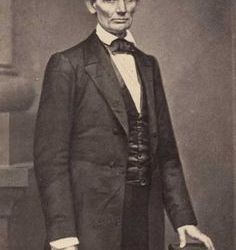
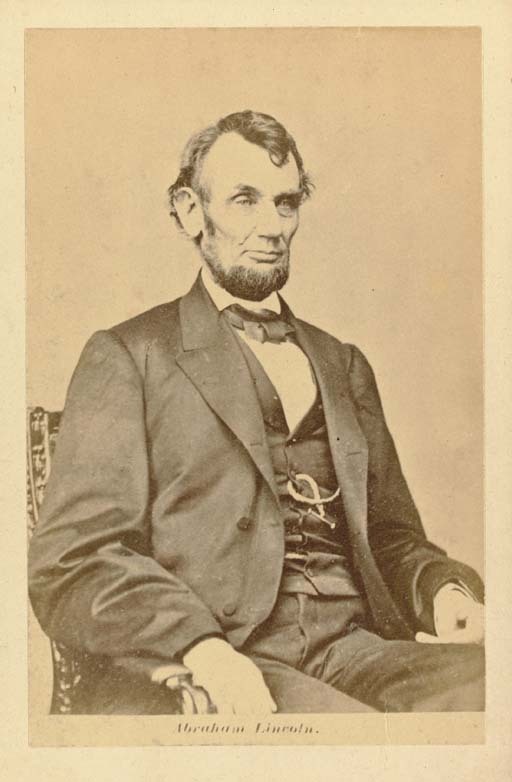

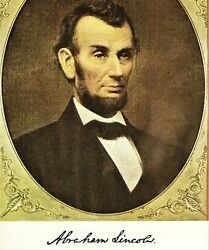
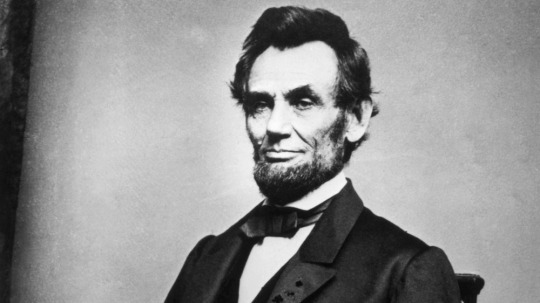
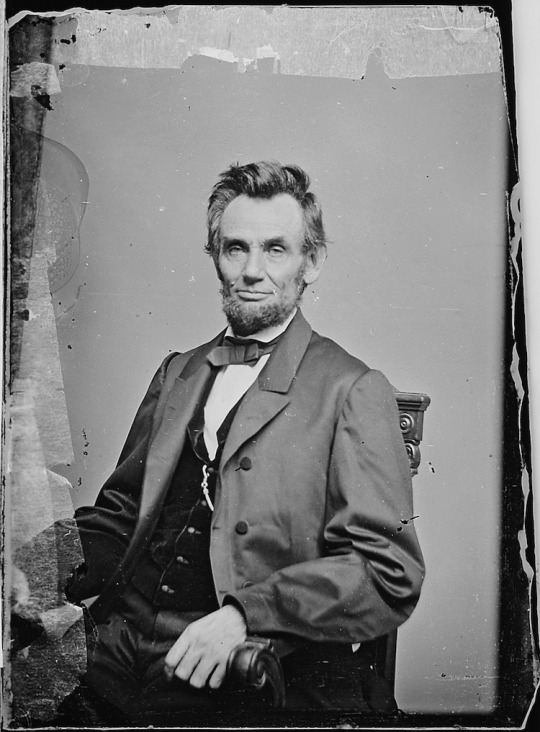
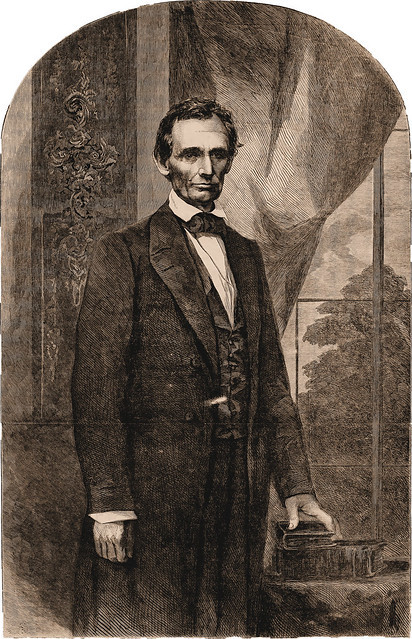
THIS DAY IN HISTORY FEBRUARY 27,1860 Mathew Brady photographs presidential candidate Abraham Lincoln On February 27, 1860, President Abraham Lincoln poses for the first of several portraits by noted Civil War-era photographer Mathew Brady. Days later, the photograph is published on the cover of Harper’s Bazaar with the caption, "Hon. Abram [sic] Lincoln, of Illinois, Republican Candidate for President."
A relatively new art form, the photograph (or daguerreotype) showed an unusually beardless Lincoln just moments before he delivered an address at Cooper Union that day. The address, in which he articulated his reasons for opposing slavery in the new territories, received wild applause and garnered strong support for his candidacy among New Yorkers.
Lincoln was re-introduced to Brady a year after his election. The president shook Brady’s hand and said Mr. Brady and the Cooper Institute made me president. Brady went on to photograph Lincoln several more times before Lincoln’s death in 1865. Brady also snapped photos of first lady Mary Todd Lincoln and two of Lincoln’s sons.
Brady’s works also include shots of President Zachary Taylor at his inauguration in 1849, President Millard Fillmore in 1850 and Confederate President Jefferson Davis in 1861. After Brady’s wife approached Mrs. Grant on behalf of her husband, General Ulysses S. Grant agreed to let Brady tag along with the Union Army during the Civil War. Many of his resulting works now reside in the Smithsonian Institution’s National Portrait Gallery.
Lincoln was not the first presidential candidate, or president, to be photographed—that honor went to John Quincy Adams in 1843.
11 notes
·
View notes